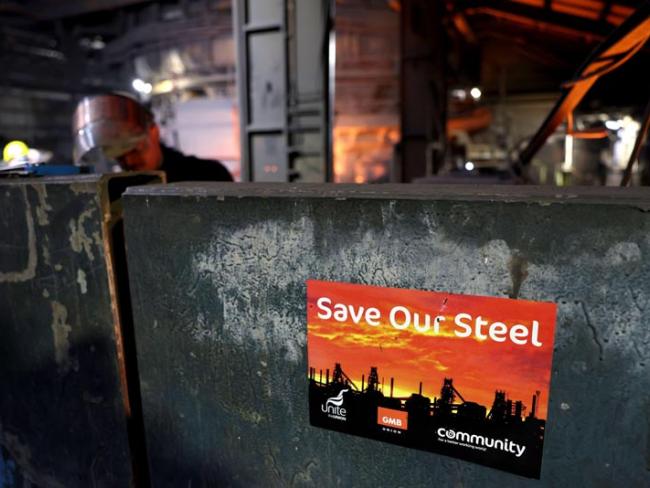
15 April: Save our Steel sign at the British Steel site in Scunthorpe, during a visit by Business Secretary Jonathan Reynolds, after ministers took over British Steel under emergency legislation to stop our last primary steelmaking facility from closing irrevocably. Photo Darren Staples/PA Media/Alamy Stock Photo.
Britain truly became united not because of an act of parliament or a monarch’s ambition. It became one with the rise of the working class and working class culture…
It was our working class to which the vast majority of the population belong that created Britain and its social and cultural fabric in the industrial revolution and beyond. In advocating for such unity that holds us together, the question immediately arises what has caused disunity, which forces have acted against our social solidarity and the national unity that flowered from that?
Fine historical examples of uniting against onslaughts from capitalists include the Clydeside shipyard work-ins that workers organised in 1971 and 1972. These were a prototype for similar work-ins and occupations throughout Britain in the several years that followed.
The miners strike in the 1980s produced a strong sense of united purpose that brought together workers and their families and community support from Fife to Kent, from Durham to the Welsh valleys. And more recently the widespread protests, rallies and industrial action against cuts and in support of wages and conditions in 2022 and 2023 impacted effectively in most cities and towns in the land.
Anti-union legislation
A big factor acting against our unity was the philosophy of Thatcherism, supported by a large majority of the working class, sad to say, which legislated to break trade union solidarity, hampering workers organising ability. The rampant legal frameworks established in the 1980s are still being used by governments today.
An era of large-scale destruction of industry was ushered in. A component part of that was an antagonistic attitude from government to society, and the atomisation of individuals. Disunity and dysfunction are effects we continue to experience.
Neglect of training for skilled work, underfunding of education, poor housing opportunities, closure of youth facilities, and the isolation experienced during the lockdown period have combined with that atomisation of society to produce widespread mental health problems among younger generations.
It is precisely for those younger generations of workers that our industries must be restored, but restored with new technologies and vision that enable their imaginations and skills to flourish. Instead unemployed youth are neglected, with half a million never having worked. The work ethic may be in danger of being lost. What could be more divisive? What could more create divisions among the generations? We must act quickly to solve such problems.
There are great dangers in being deindustrialised for too long. The lack of skilled engineers and other highly trained workers hampers the passing-on of skilled knowledge. Consequences include the lack of new infrastructure, lack of advanced manufacturing lines, lack of industrial robotics, lack of supply chains, lack of investment in this country. It then becomes very difficult to rebuild manufacturing.
Capitalism attempts to extract more profits from its archaic practices and imported labour and skills from abroad are used to do so. And now, as globalisation crumbles, Britain finds itself wholly ill-prepared.
Divisions fostered
Capitalism, especially when in crisis, seeks cheaper options and the ability to exploit more effectively. Hence the growing encouragement of immigration of working age men. It then promotes the tarring of those who object with the tags of racism or far-right. Thus more divisiveness is created so its a win-win.
But that is countered strongly by those workers in Britain who regard anyone working in this land by definition to be a member of the working class, and to stand alongside them in solidarity against the employer and the state. A recent article in Workers summed this up, Not only is this an economic attack, but it is fostering divisions between workers at a time when they need unity.
Stand for peace
First and foremost we need peace to rebuild our industry and culture and create a united country. Not to rebuild it disintegrates the nation and its working class.
Deindustrialisation and its debilitating effects on workers is a subject dealt with in a new study on Rolls-Royce engineers and deindustrialisation in Scotland from the 1950s to the 2020s by Ewan Gibbs and others.
‘First and foremost we need peace to rebuild our industry and culture and create a united country. Not to rebuild it disintegrates the nation and its working class…’
One example from the study brings the question of youth again to the fore: A welder underlined his greatest regret arising from closure was the fate of apprentices. They were left high and dry. The study aims to help scholars in all disciplines to sharpen their understanding of deindustrialisation, as a continuing full-time phenomenon, live and contested in the third decade of the twenty-first century.
Although the study is specifically about Scotland, the unions fighting closures represent workers throughout the whole of Britain. This key factor proved decisive in the referendum of 2014 (and the two years of fierce debate that led up to that) in which the proposal to separate Scotland from the rest of Britain was firmly rejected.
Six trade unions campaigned on the side of unity, held debates among their members and organised public events. That successfully countered any danger of the argument becoming polarised between the false divisions of left and right.
Since then the separatist movement has deteriorated considerably and can be considered a spent force. Some polls show the occasional resurgence, but in both Scotland and Wales separatist ideas are in decline.
But this has not stopped the Scottish administration, for example, advocating for Britain to rejoin the European Union. These advocates of separatism or regionalism look fondly to global markets rather than making things here. They are now receiving a big shock.
